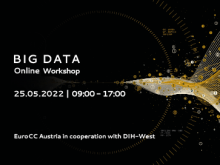EuroCC Austria
Big Data – wie lässt sich die Datenflut zähmen?
Big Data – wohin mit der Datenflut?
Processing of sensors data
The study course will provide knowledge about real-time sensor measurement techniques, measurement, data transfer and processing technologies, and the principles of sensor networking. Students will be introduced theoretically and practically to the techniques required for mechatronics and mechanical ingeneering sensor data processing.
Rezekne Academy of Technologies
Basics of artificial intelligence
The aim of the course is to provide an insight into the basic procedures of quantitative information processing obtained in research results for programming engineers, using modern information technologies and learning their practical application. To give an initial idea about artificial neural networks and their application possibilities, to be able to apply the use of artificial intelligence methods in real situations.



